PICO Question - Assignment
VerifiedAdded on 2021/05/27
|7
|1445
|244
AI Summary
Contribute Materials
Your contribution can guide someone’s learning journey. Share your
documents today.
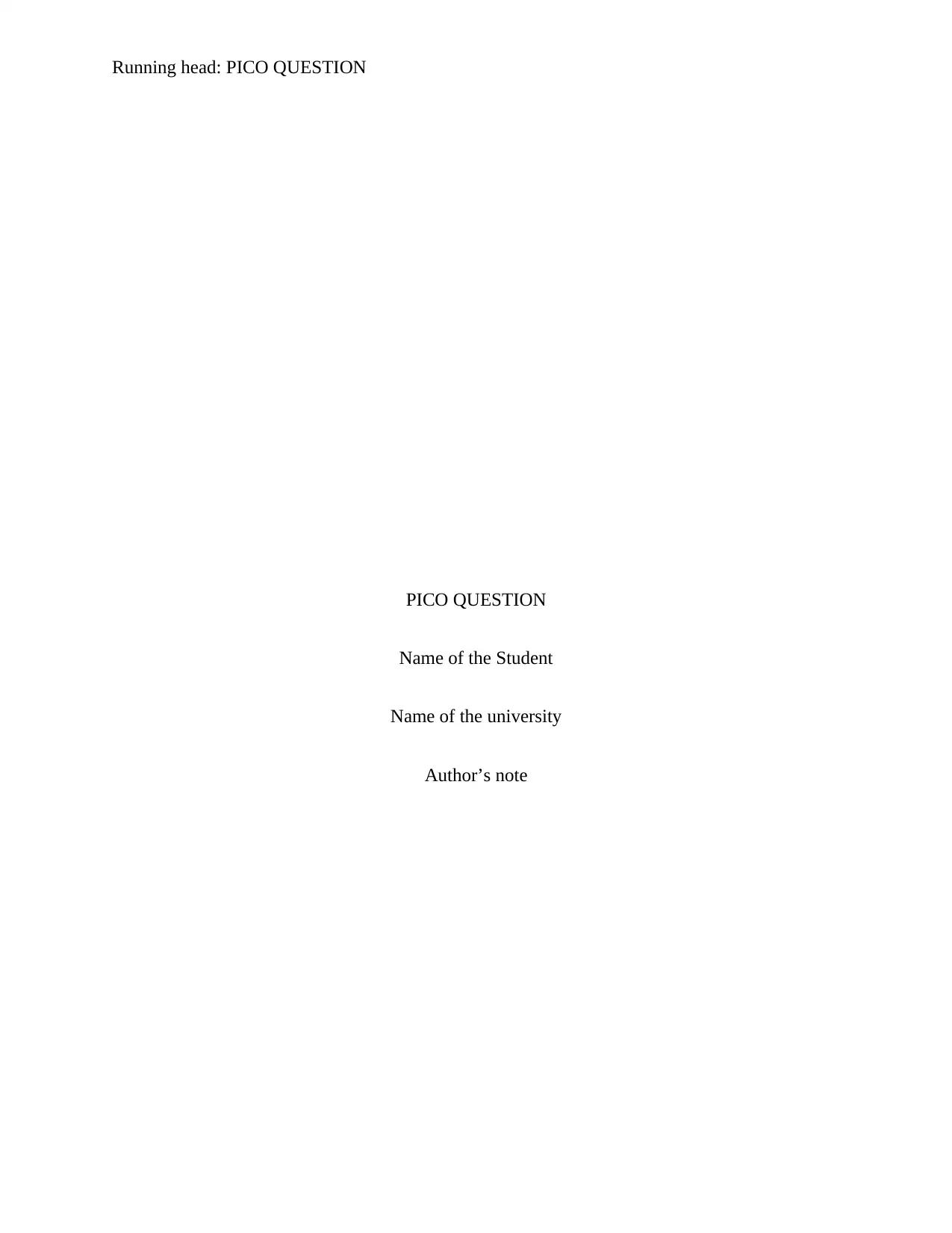
Running head: PICO QUESTION
PICO QUESTION
Name of the Student
Name of the university
Author’s note
PICO QUESTION
Name of the Student
Name of the university
Author’s note
Secure Best Marks with AI Grader
Need help grading? Try our AI Grader for instant feedback on your assignments.
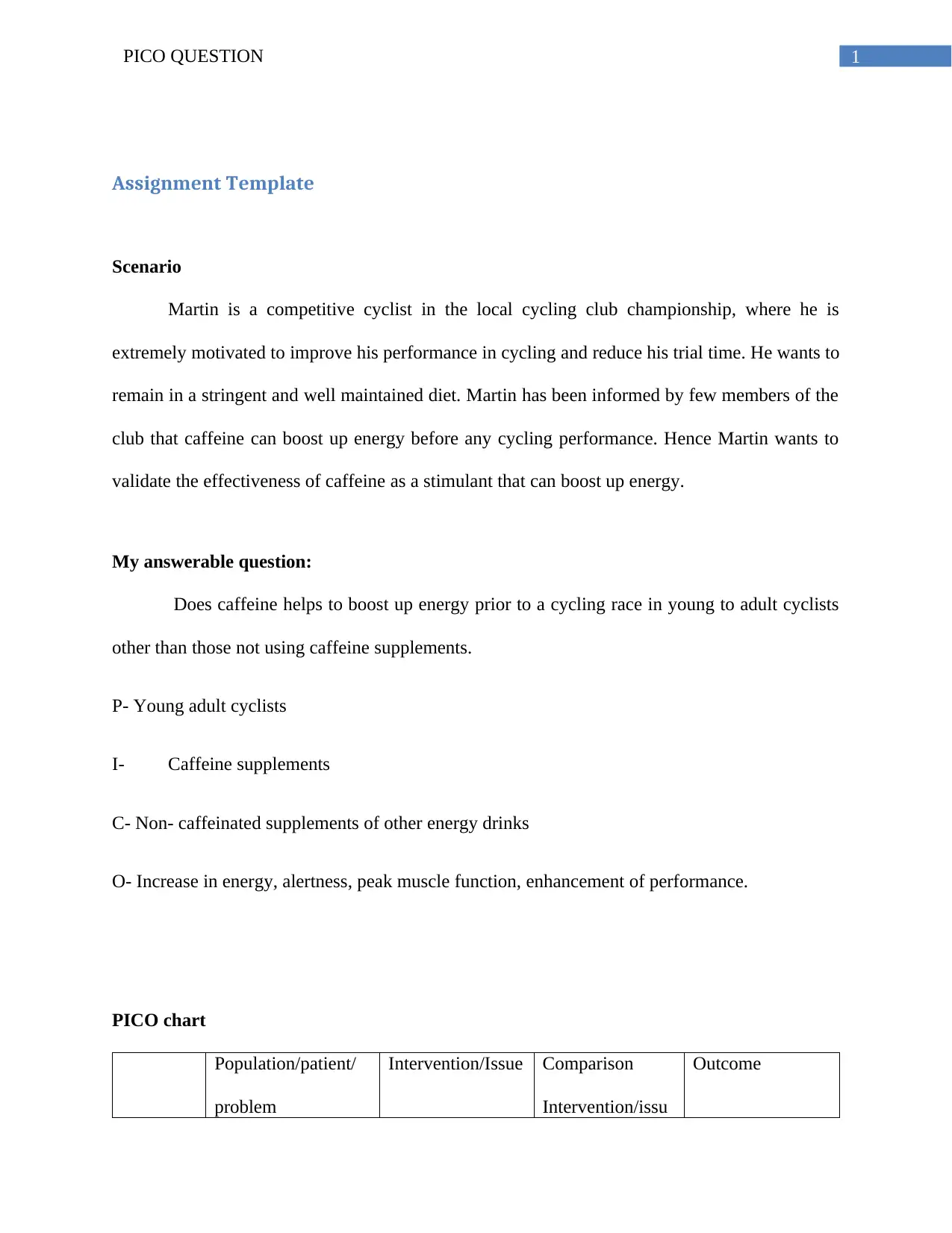
1PICO QUESTION
Assignment Template
Scenario
Martin is a competitive cyclist in the local cycling club championship, where he is
extremely motivated to improve his performance in cycling and reduce his trial time. He wants to
remain in a stringent and well maintained diet. Martin has been informed by few members of the
club that caffeine can boost up energy before any cycling performance. Hence Martin wants to
validate the effectiveness of caffeine as a stimulant that can boost up energy.
My answerable question:
Does caffeine helps to boost up energy prior to a cycling race in young to adult cyclists
other than those not using caffeine supplements.
P- Young adult cyclists
I- Caffeine supplements
C- Non- caffeinated supplements of other energy drinks
O- Increase in energy, alertness, peak muscle function, enhancement of performance.
PICO chart
Population/patient/
problem
Intervention/Issue Comparison
Intervention/issu
Outcome
Assignment Template
Scenario
Martin is a competitive cyclist in the local cycling club championship, where he is
extremely motivated to improve his performance in cycling and reduce his trial time. He wants to
remain in a stringent and well maintained diet. Martin has been informed by few members of the
club that caffeine can boost up energy before any cycling performance. Hence Martin wants to
validate the effectiveness of caffeine as a stimulant that can boost up energy.
My answerable question:
Does caffeine helps to boost up energy prior to a cycling race in young to adult cyclists
other than those not using caffeine supplements.
P- Young adult cyclists
I- Caffeine supplements
C- Non- caffeinated supplements of other energy drinks
O- Increase in energy, alertness, peak muscle function, enhancement of performance.
PICO chart
Population/patient/
problem
Intervention/Issue Comparison
Intervention/issu
Outcome
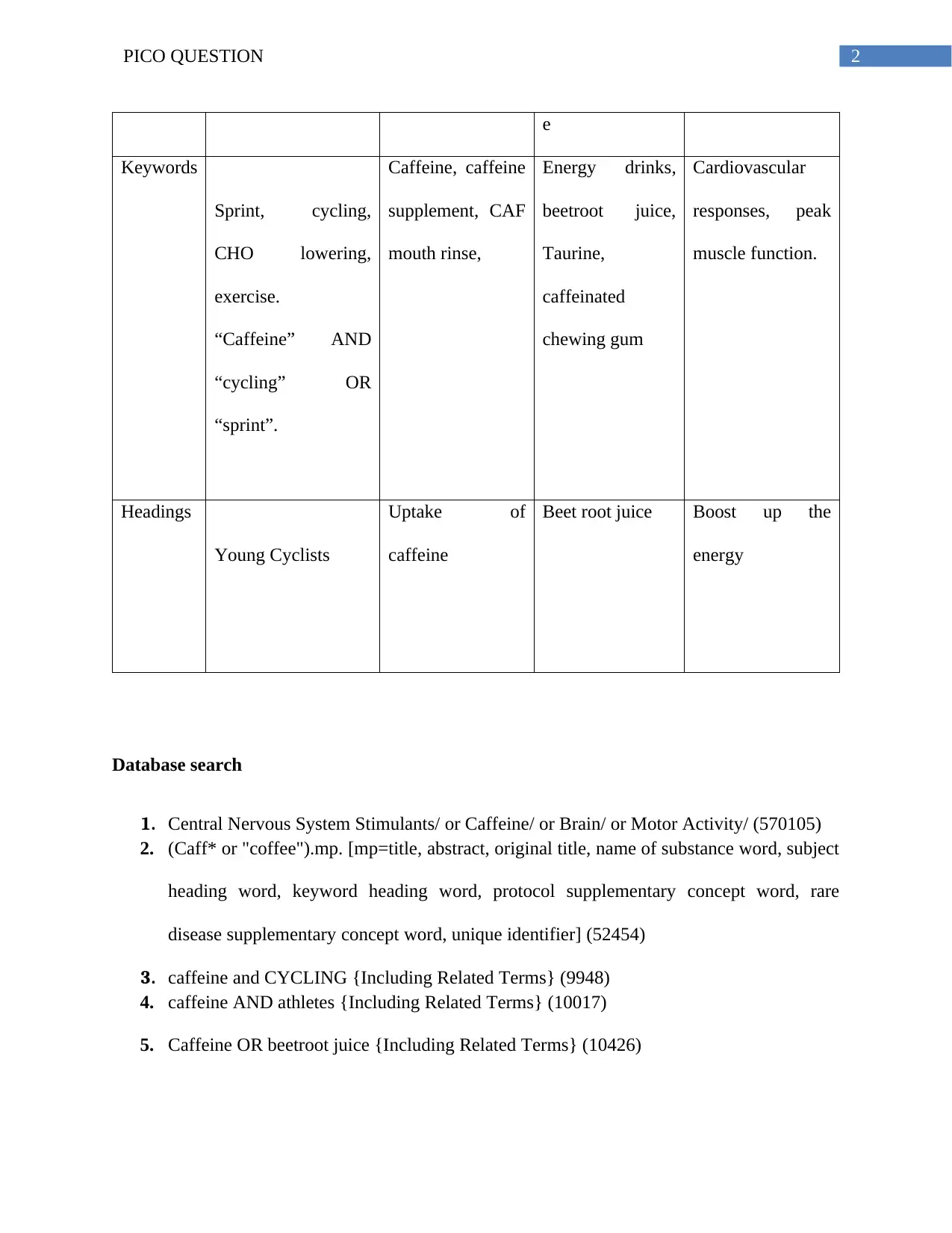
2PICO QUESTION
e
Keywords
Sprint, cycling,
CHO lowering,
exercise.
“Caffeine” AND
“cycling” OR
“sprint”.
Caffeine, caffeine
supplement, CAF
mouth rinse,
Energy drinks,
beetroot juice,
Taurine,
caffeinated
chewing gum
Cardiovascular
responses, peak
muscle function.
Headings
Young Cyclists
Uptake of
caffeine
Beet root juice Boost up the
energy
Database search
1. Central Nervous System Stimulants/ or Caffeine/ or Brain/ or Motor Activity/ (570105)
2. (Caff* or "coffee").mp. [mp=title, abstract, original title, name of substance word, subject
heading word, keyword heading word, protocol supplementary concept word, rare
disease supplementary concept word, unique identifier] (52454)
3. caffeine and CYCLING {Including Related Terms} (9948)
4. caffeine AND athletes {Including Related Terms} (10017)
5. Caffeine OR beetroot juice {Including Related Terms} (10426)
e
Keywords
Sprint, cycling,
CHO lowering,
exercise.
“Caffeine” AND
“cycling” OR
“sprint”.
Caffeine, caffeine
supplement, CAF
mouth rinse,
Energy drinks,
beetroot juice,
Taurine,
caffeinated
chewing gum
Cardiovascular
responses, peak
muscle function.
Headings
Young Cyclists
Uptake of
caffeine
Beet root juice Boost up the
energy
Database search
1. Central Nervous System Stimulants/ or Caffeine/ or Brain/ or Motor Activity/ (570105)
2. (Caff* or "coffee").mp. [mp=title, abstract, original title, name of substance word, subject
heading word, keyword heading word, protocol supplementary concept word, rare
disease supplementary concept word, unique identifier] (52454)
3. caffeine and CYCLING {Including Related Terms} (9948)
4. caffeine AND athletes {Including Related Terms} (10017)
5. Caffeine OR beetroot juice {Including Related Terms} (10426)
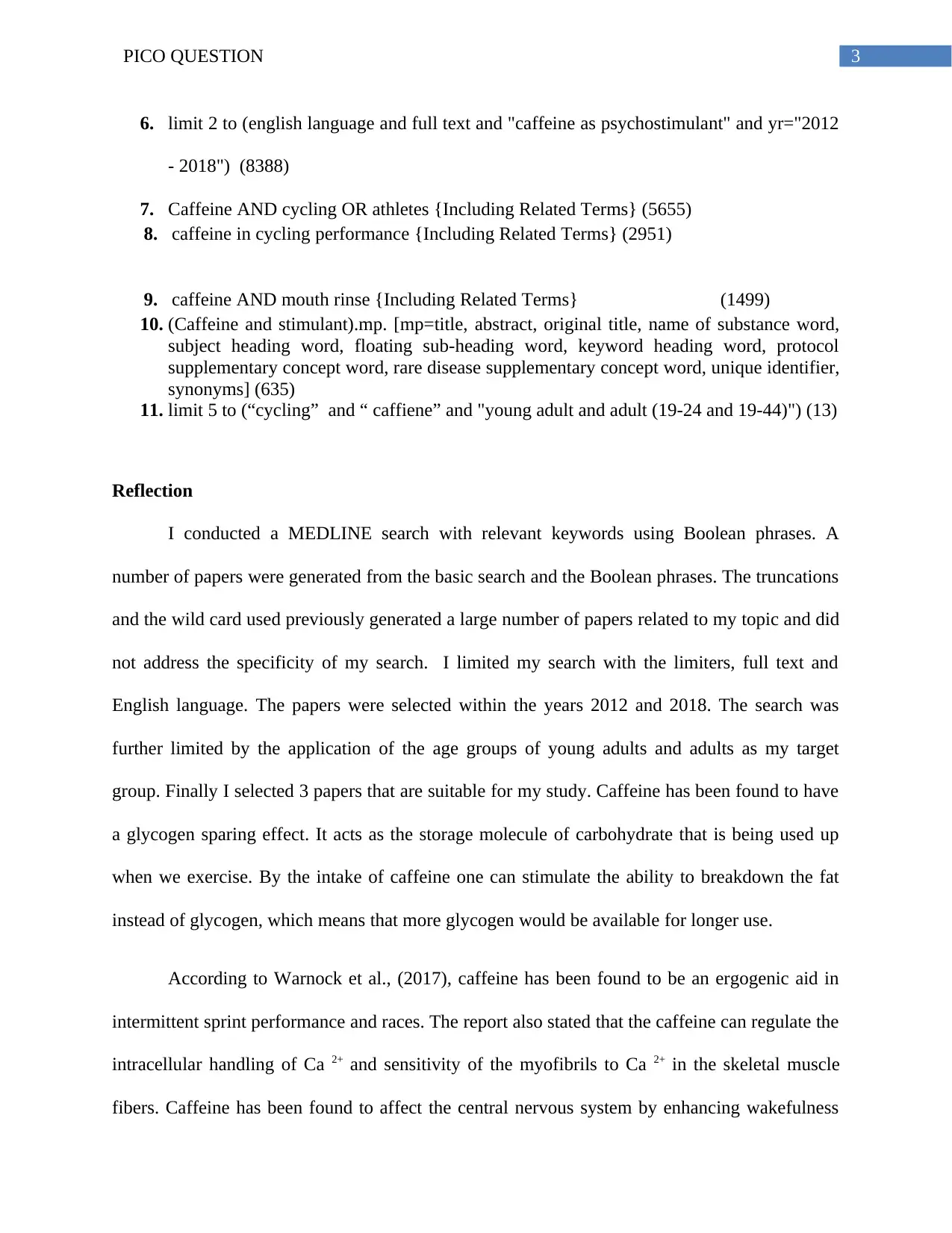
3PICO QUESTION
6. limit 2 to (english language and full text and "caffeine as psychostimulant" and yr="2012
- 2018") (8388)
7. Caffeine AND cycling OR athletes {Including Related Terms} (5655)
8. caffeine in cycling performance {Including Related Terms} (2951)
9. caffeine AND mouth rinse {Including Related Terms} (1499)
10. (Caffeine and stimulant).mp. [mp=title, abstract, original title, name of substance word,
subject heading word, floating sub-heading word, keyword heading word, protocol
supplementary concept word, rare disease supplementary concept word, unique identifier,
synonyms] (635)
11. limit 5 to (“cycling” and “ caffiene” and "young adult and adult (19-24 and 19-44)") (13)
Reflection
I conducted a MEDLINE search with relevant keywords using Boolean phrases. A
number of papers were generated from the basic search and the Boolean phrases. The truncations
and the wild card used previously generated a large number of papers related to my topic and did
not address the specificity of my search. I limited my search with the limiters, full text and
English language. The papers were selected within the years 2012 and 2018. The search was
further limited by the application of the age groups of young adults and adults as my target
group. Finally I selected 3 papers that are suitable for my study. Caffeine has been found to have
a glycogen sparing effect. It acts as the storage molecule of carbohydrate that is being used up
when we exercise. By the intake of caffeine one can stimulate the ability to breakdown the fat
instead of glycogen, which means that more glycogen would be available for longer use.
According to Warnock et al., (2017), caffeine has been found to be an ergogenic aid in
intermittent sprint performance and races. The report also stated that the caffeine can regulate the
intracellular handling of Ca 2+ and sensitivity of the myofibrils to Ca 2+ in the skeletal muscle
fibers. Caffeine has been found to affect the central nervous system by enhancing wakefulness
6. limit 2 to (english language and full text and "caffeine as psychostimulant" and yr="2012
- 2018") (8388)
7. Caffeine AND cycling OR athletes {Including Related Terms} (5655)
8. caffeine in cycling performance {Including Related Terms} (2951)
9. caffeine AND mouth rinse {Including Related Terms} (1499)
10. (Caffeine and stimulant).mp. [mp=title, abstract, original title, name of substance word,
subject heading word, floating sub-heading word, keyword heading word, protocol
supplementary concept word, rare disease supplementary concept word, unique identifier,
synonyms] (635)
11. limit 5 to (“cycling” and “ caffiene” and "young adult and adult (19-24 and 19-44)") (13)
Reflection
I conducted a MEDLINE search with relevant keywords using Boolean phrases. A
number of papers were generated from the basic search and the Boolean phrases. The truncations
and the wild card used previously generated a large number of papers related to my topic and did
not address the specificity of my search. I limited my search with the limiters, full text and
English language. The papers were selected within the years 2012 and 2018. The search was
further limited by the application of the age groups of young adults and adults as my target
group. Finally I selected 3 papers that are suitable for my study. Caffeine has been found to have
a glycogen sparing effect. It acts as the storage molecule of carbohydrate that is being used up
when we exercise. By the intake of caffeine one can stimulate the ability to breakdown the fat
instead of glycogen, which means that more glycogen would be available for longer use.
According to Warnock et al., (2017), caffeine has been found to be an ergogenic aid in
intermittent sprint performance and races. The report also stated that the caffeine can regulate the
intracellular handling of Ca 2+ and sensitivity of the myofibrils to Ca 2+ in the skeletal muscle
fibers. Caffeine has been found to affect the central nervous system by enhancing wakefulness
Secure Best Marks with AI Grader
Need help grading? Try our AI Grader for instant feedback on your assignments.
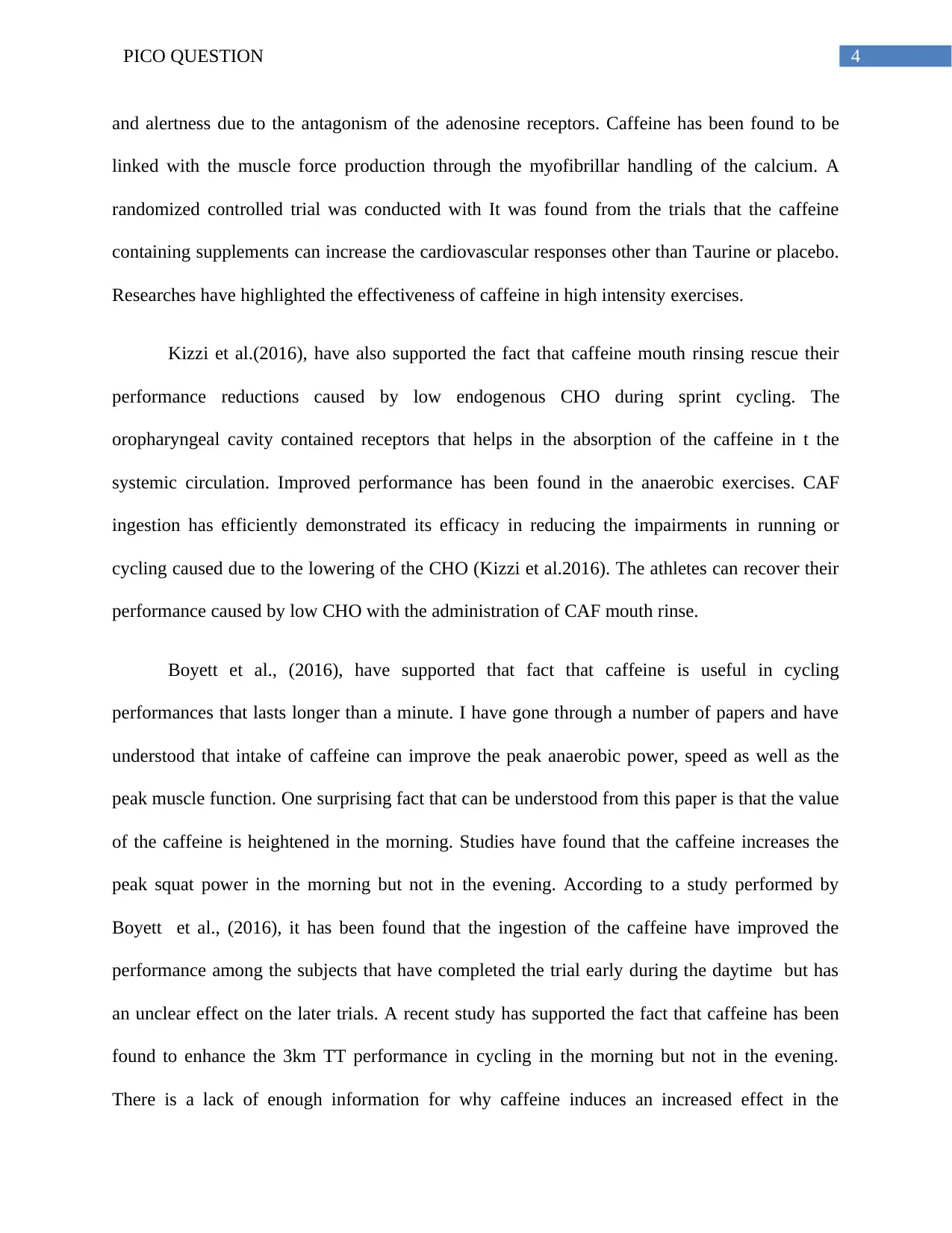
4PICO QUESTION
and alertness due to the antagonism of the adenosine receptors. Caffeine has been found to be
linked with the muscle force production through the myofibrillar handling of the calcium. A
randomized controlled trial was conducted with It was found from the trials that the caffeine
containing supplements can increase the cardiovascular responses other than Taurine or placebo.
Researches have highlighted the effectiveness of caffeine in high intensity exercises.
Kizzi et al.(2016), have also supported the fact that caffeine mouth rinsing rescue their
performance reductions caused by low endogenous CHO during sprint cycling. The
oropharyngeal cavity contained receptors that helps in the absorption of the caffeine in t the
systemic circulation. Improved performance has been found in the anaerobic exercises. CAF
ingestion has efficiently demonstrated its efficacy in reducing the impairments in running or
cycling caused due to the lowering of the CHO (Kizzi et al.2016). The athletes can recover their
performance caused by low CHO with the administration of CAF mouth rinse.
Boyett et al., (2016), have supported that fact that caffeine is useful in cycling
performances that lasts longer than a minute. I have gone through a number of papers and have
understood that intake of caffeine can improve the peak anaerobic power, speed as well as the
peak muscle function. One surprising fact that can be understood from this paper is that the value
of the caffeine is heightened in the morning. Studies have found that the caffeine increases the
peak squat power in the morning but not in the evening. According to a study performed by
Boyett et al., (2016), it has been found that the ingestion of the caffeine have improved the
performance among the subjects that have completed the trial early during the daytime but has
an unclear effect on the later trials. A recent study has supported the fact that caffeine has been
found to enhance the 3km TT performance in cycling in the morning but not in the evening.
There is a lack of enough information for why caffeine induces an increased effect in the
and alertness due to the antagonism of the adenosine receptors. Caffeine has been found to be
linked with the muscle force production through the myofibrillar handling of the calcium. A
randomized controlled trial was conducted with It was found from the trials that the caffeine
containing supplements can increase the cardiovascular responses other than Taurine or placebo.
Researches have highlighted the effectiveness of caffeine in high intensity exercises.
Kizzi et al.(2016), have also supported the fact that caffeine mouth rinsing rescue their
performance reductions caused by low endogenous CHO during sprint cycling. The
oropharyngeal cavity contained receptors that helps in the absorption of the caffeine in t the
systemic circulation. Improved performance has been found in the anaerobic exercises. CAF
ingestion has efficiently demonstrated its efficacy in reducing the impairments in running or
cycling caused due to the lowering of the CHO (Kizzi et al.2016). The athletes can recover their
performance caused by low CHO with the administration of CAF mouth rinse.
Boyett et al., (2016), have supported that fact that caffeine is useful in cycling
performances that lasts longer than a minute. I have gone through a number of papers and have
understood that intake of caffeine can improve the peak anaerobic power, speed as well as the
peak muscle function. One surprising fact that can be understood from this paper is that the value
of the caffeine is heightened in the morning. Studies have found that the caffeine increases the
peak squat power in the morning but not in the evening. According to a study performed by
Boyett et al., (2016), it has been found that the ingestion of the caffeine have improved the
performance among the subjects that have completed the trial early during the daytime but has
an unclear effect on the later trials. A recent study has supported the fact that caffeine has been
found to enhance the 3km TT performance in cycling in the morning but not in the evening.
There is a lack of enough information for why caffeine induces an increased effect in the
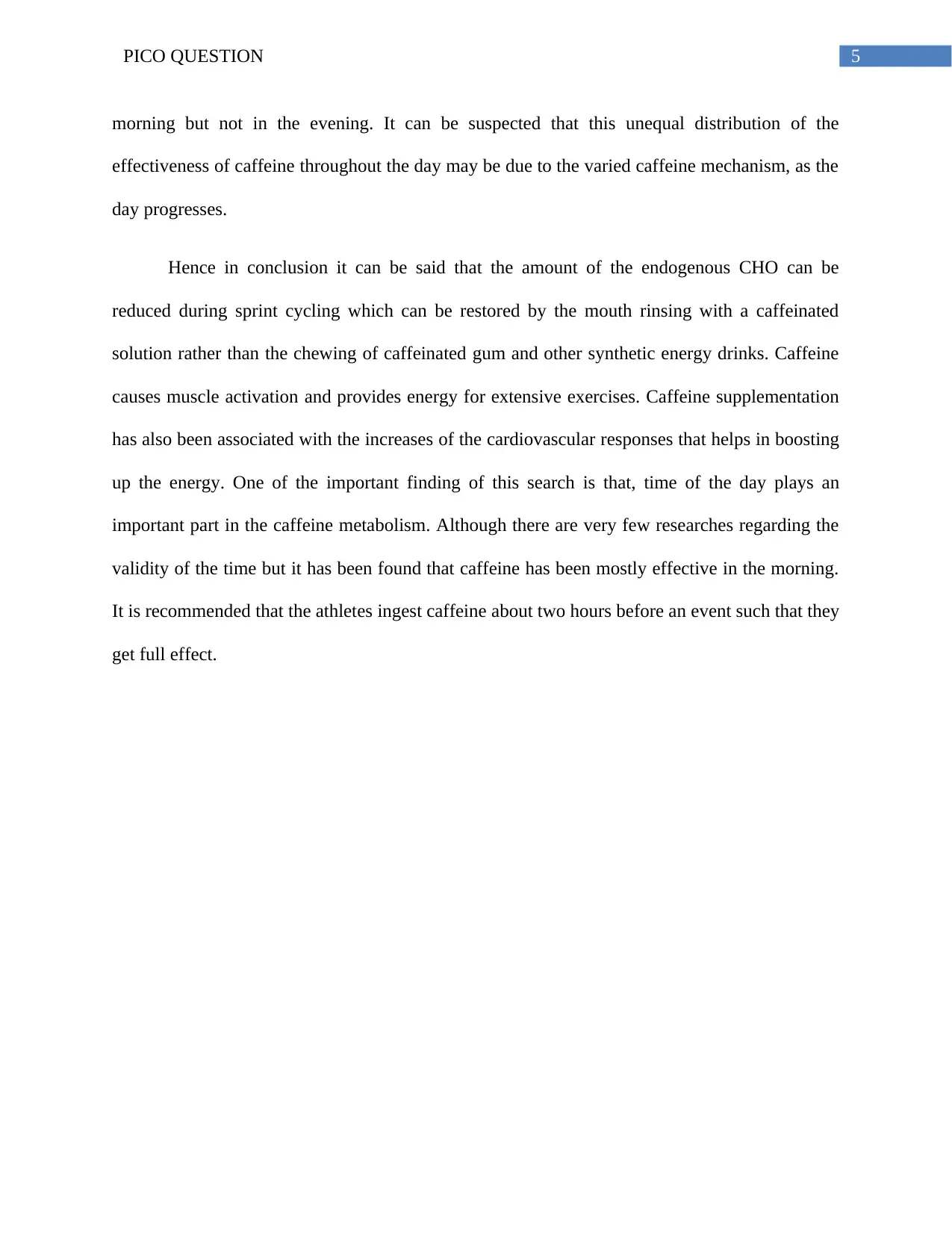
5PICO QUESTION
morning but not in the evening. It can be suspected that this unequal distribution of the
effectiveness of caffeine throughout the day may be due to the varied caffeine mechanism, as the
day progresses.
Hence in conclusion it can be said that the amount of the endogenous CHO can be
reduced during sprint cycling which can be restored by the mouth rinsing with a caffeinated
solution rather than the chewing of caffeinated gum and other synthetic energy drinks. Caffeine
causes muscle activation and provides energy for extensive exercises. Caffeine supplementation
has also been associated with the increases of the cardiovascular responses that helps in boosting
up the energy. One of the important finding of this search is that, time of the day plays an
important part in the caffeine metabolism. Although there are very few researches regarding the
validity of the time but it has been found that caffeine has been mostly effective in the morning.
It is recommended that the athletes ingest caffeine about two hours before an event such that they
get full effect.
morning but not in the evening. It can be suspected that this unequal distribution of the
effectiveness of caffeine throughout the day may be due to the varied caffeine mechanism, as the
day progresses.
Hence in conclusion it can be said that the amount of the endogenous CHO can be
reduced during sprint cycling which can be restored by the mouth rinsing with a caffeinated
solution rather than the chewing of caffeinated gum and other synthetic energy drinks. Caffeine
causes muscle activation and provides energy for extensive exercises. Caffeine supplementation
has also been associated with the increases of the cardiovascular responses that helps in boosting
up the energy. One of the important finding of this search is that, time of the day plays an
important part in the caffeine metabolism. Although there are very few researches regarding the
validity of the time but it has been found that caffeine has been mostly effective in the morning.
It is recommended that the athletes ingest caffeine about two hours before an event such that they
get full effect.
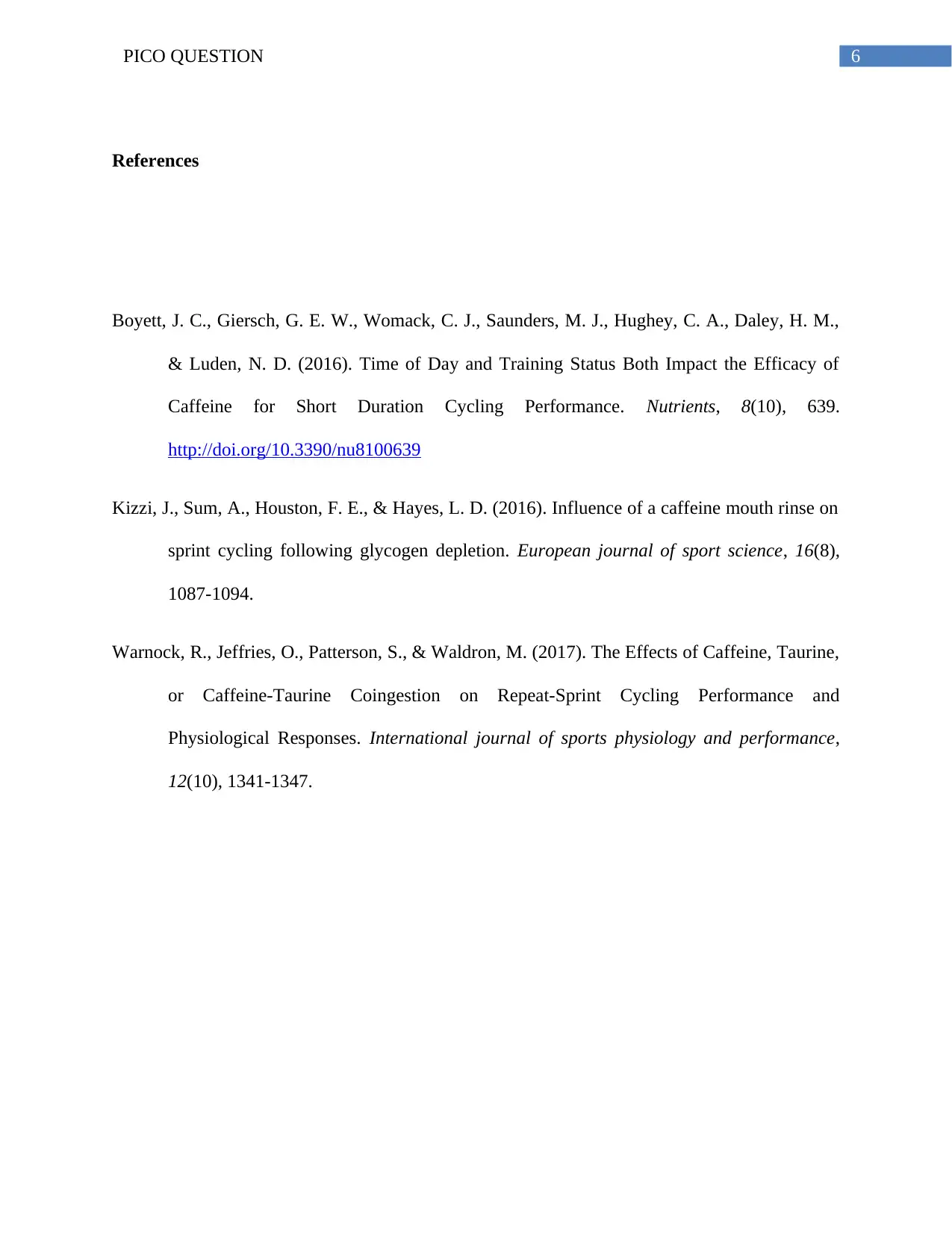
6PICO QUESTION
References
Boyett, J. C., Giersch, G. E. W., Womack, C. J., Saunders, M. J., Hughey, C. A., Daley, H. M.,
& Luden, N. D. (2016). Time of Day and Training Status Both Impact the Efficacy of
Caffeine for Short Duration Cycling Performance. Nutrients, 8(10), 639.
http://doi.org/10.3390/nu8100639
Kizzi, J., Sum, A., Houston, F. E., & Hayes, L. D. (2016). Influence of a caffeine mouth rinse on
sprint cycling following glycogen depletion. European journal of sport science, 16(8),
1087-1094.
Warnock, R., Jeffries, O., Patterson, S., & Waldron, M. (2017). The Effects of Caffeine, Taurine,
or Caffeine-Taurine Coingestion on Repeat-Sprint Cycling Performance and
Physiological Responses. International journal of sports physiology and performance,
12(10), 1341-1347.
References
Boyett, J. C., Giersch, G. E. W., Womack, C. J., Saunders, M. J., Hughey, C. A., Daley, H. M.,
& Luden, N. D. (2016). Time of Day and Training Status Both Impact the Efficacy of
Caffeine for Short Duration Cycling Performance. Nutrients, 8(10), 639.
http://doi.org/10.3390/nu8100639
Kizzi, J., Sum, A., Houston, F. E., & Hayes, L. D. (2016). Influence of a caffeine mouth rinse on
sprint cycling following glycogen depletion. European journal of sport science, 16(8),
1087-1094.
Warnock, R., Jeffries, O., Patterson, S., & Waldron, M. (2017). The Effects of Caffeine, Taurine,
or Caffeine-Taurine Coingestion on Repeat-Sprint Cycling Performance and
Physiological Responses. International journal of sports physiology and performance,
12(10), 1341-1347.
1 out of 7
Your All-in-One AI-Powered Toolkit for Academic Success.
+13062052269
info@desklib.com
Available 24*7 on WhatsApp / Email
![[object Object]](/_next/static/media/star-bottom.7253800d.svg)
Unlock your academic potential
© 2024 | Zucol Services PVT LTD | All rights reserved.
